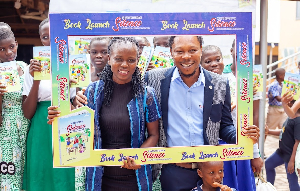 Author Rhoda Kadoa Wedam (left) and Cecil Senna Nutakor (eCampus app founder) after the launch
Author Rhoda Kadoa Wedam (left) and Cecil Senna Nutakor (eCampus app founder) after the launch
Conversations about menstruation, a natural occurrence in women, have for centuries been considered taboo in many cultures and societies in the world.
Millions of girls and women are suffering in silence, girls miss school or even drop out altogether to avoid being teased and ridiculed due to the misinformation, shame and stigma surrounding menstruation.
Many girls experience their first menses with extreme shock and alarm, without knowing anything at all about menstruation, others are bombarded with some superstitions and misinformation.
The phenomenon occurs in women every 28 days cycle for 5 days on average. A decade ago, on May 28, 2014, Menstrual Hygiene Day was first observed globally and has since been celebrated every year on the 28th day of the 5th month of the year.
The day is dedicated to breaking taboos and raising awareness about access to menstrual products and the importance of good menstrual hygiene management (MHM).
According to UNICEF, around 1.8 billion people across the world menstruate every month. The majority of them are young people living in the global south, especially in Africa.
There is an urgent need to educate the general public on menstruation in general, menstrual hygiene in particular and as a necessity, advocating for a menstruation-friendly society.
Rhoda Kadoa Wedam, a menstrual hygiene advocate and founder of the Song-Ba Empowerment Centre located in Tamale, Northern Region of Ghana authored the book “No More Suffering in Silence. An Illustrated Guide on Menstruation” to help parents, teachers, girls and women, boys and men understand the significance of menstruation, the importance on menstrual hygiene and the collective responsibility of everyone in providing a supportive environment to our sisters and mothers who for no faults of theirs must experience the natural occurrence of menstruation every 28 days.
eCampus founder and chief executive, Cecil Senna Nutakor met the author of "No More Suffering in Silence," Rhoda Kadoa Wedam at Lucy Quist’s Bold New Normal conference as panellists in October of 2023 in Accra, Ghana.
A collaboration was initiated between eCampus and the author to create an interactive digital version of the book; No More Suffering in Silence in English, French and Arabic for distribution on the eCampus app across its mobile and web platforms.
On Africa Day, May 25, 2024, the paperback and interactive digital copies of the menstrual hygiene book; No More Suffering in Silence were successfully launched in Tamale, Northern Region of Ghana in preparation for the 10th Anniversary of World Menstrual Hygiene Day celebrations which was marked on May 28, 2024, with the theme "A Period Friendly World."
Several dignitaries were in attendance at the book launch committed to advancing menstrual hygiene advocacy.
Madam Beata Akanjani, Chairperson for the Ghana Coalition of NGOs in Water and Sanitation Sector (Coniwas), gave a presentation on the 2024 theme for the celebration of menstrual hygiene day which states ‘Together for a #PeriodFriendlyWorld’.
She pointed out the fact that in Ghana, girls miss up to 5 school days a month during menstruation due to inadequate WASH facilities, lack of sanitary products and feelings of discomfort, e.g. cramps (Sanitary Pad Interventions for Girls’ Education in Ghana, 2012).
This translates to approximately 15 school days per school term and 45 per academic year, enough to cause failure in an exam, further disadvantaging girls and perpetuating gender inequality.
Rev. Sanatu Nantogma, the Executive Director of Tuma Kavi Development Association, gave the speech that officially launched the book with other dignitaries.
Furthermore, she quoted a 2011 UNESCO study, saying it was established that every extra year of a woman’s schooling reduces the probability of infant mortality by 5 to 10 percent.
"This statistic underscores the far-reaching impact of education on societal health and well-being. By providing girls with the necessary resources (including relevant information as contained in Rhoda’s No More Suffering in Silence) to manage their menstruation and thereby facilitating their stay in school, we are not only improving their lives but also contributing to the broader health and wellbeing of our communities," he stressed.
The Northern Regional Director of Ghana Education Service was represented by Mrs Linda Amoah, the Girl Child Coordinator for the region.
She mentioned that there has always been misinformation about menstruation and often seen as a taboo in some communities which has had some negative impact on girls. She also mentioned the absence of structures in schools to help girls cope with menstruation. The launch of the book is timely and will help girls deal with the issues of menstruation and while serving as a guide to teachers and parents.
The Chief of Mission for UNICEF, Tamale. Bhanu Pathak extended his solidarity message with a speech. He stated that UNICEF focus on sanitation and hygiene as a global concern. Menstrual hygiene has been approved by the Board of UNICEF as a core program in which they are working to improve the access to menstrual hygiene supplies. He promised that UNICEF would support dissemination the books in Ghana.
The Sabta-Naa of the Dagbon gave his solidarity message as well as various Development Partners such as World Vision, Afram Plains Development Organization, Catholic Relief Services and Adamfo Ghana. The individuals who also shared their solidarity messages were Sussane Bellinghausen, Board Chair of Song-Ba Empowerment Centre. Lucy Quist, Founding member of the Executive Women Network, Janet Sunkwa-Mill, Executive Chair of the Executive Women Network and Kevin Brosnahan from the U.S Embassy, Ghana.
To make the book widely accessible to young girls and boys, 10,000 copies of the paperback book will be distributed to schools across Ghana in the first phase this year.
The interactive digital version of the book is available globally online via the eCampus mobile and web Apps